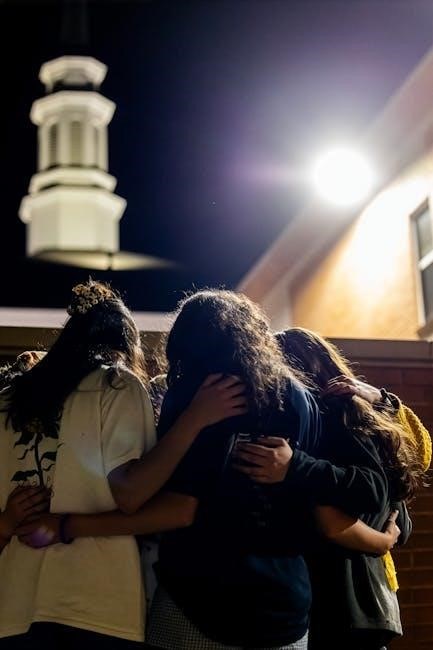Night by Elie Wiesel is a haunting memoir about his Holocaust experiences. The PDF version is widely available, offering a poignant glimpse into one of history’s darkest periods.
Overview of the Book
Night by Elie Wiesel is a powerful memoir recounting his harrowing experiences during the Holocaust. The book chronicles his journey from a peaceful childhood in Sighet to the horrors of Auschwitz and Buchenwald. Wiesel vividly describes the emotional and physical struggles he faced, including the loss of his family and faith. The memoir is a poignant reflection on humanity, hope, and survival. Its concise yet impactful narrative has made it a cornerstone of Holocaust literature. The PDF version of Night is widely accessible, allowing readers to engage with this essential historical account digitally.
Importance of the Memoir in Holocaust Literature
Night by Elie Wiesel stands as a seminal work in Holocaust literature, offering a deeply personal and unflinching account of survival. Its raw honesty and emotional depth provide a unique perspective on the atrocities of the Holocaust, making it a crucial educational resource. The memoir bridges the gap between historical facts and personal testimony, ensuring that the voices of victims are not forgotten. Its availability in PDF format has furthered its reach, allowing new generations to confront the horrors of the past and reflect on humanity’s capacity for resilience and hope.
Availability of the PDF Version
The PDF version of Night by Elie Wiesel is widely accessible online, offering readers a convenient way to engage with this powerful memoir. Platforms like the Internet Archive and various educational websites provide free downloads, while paid versions are available through major bookstores. The PDF format ensures compatibility across devices, making it easy to read on smartphones, tablets, or computers. However, users are encouraged to verify the legitimacy of sources to avoid copyright infringement. This accessibility has made Night a widely read and studied text, ensuring its message reaches a global audience.
Themes and Symbolism in “Night”
In Night, Elie Wiesel examines faith, doubt, and lost innocence, using darkness to symbolize the Holocaust’s moral emptiness, deeply affecting readers universally.
The Theme of Faith and Doubt
In Night, Elie Wiesel explores the profound struggle with faith amidst unimaginable suffering. The Holocaust forces Eliezer to question his belief in a just God, reflecting the broader crisis of spirituality during the Holocaust. Through his journey, Wiesel portrays the tension between maintaining faith and succumbing to doubt, highlighting the moral and existential dilemmas faced by victims. This theme resonates deeply, offering a powerful exploration of humanity’s search for meaning in the face of unimaginable evil, making the PDF version a vital resource for understanding this complex struggle.
The Symbolism of Darkness and Night

In Night, darkness and night symbolize the moral and emotional void of the Holocaust. Elie Wiesel uses these elements to convey the absence of hope and the dehumanization of victims. The recurring imagery of night reflects the spiritual darkness that envelops the characters, mirroring the atrocities committed. The loss of light symbolizes the erosion of faith and humanity, while the physical darkness of the camps hides the horrors from the world. This symbolism underscores the profound psychological and emotional toll on survivors, making the PDF version a crucial resource for understanding these themes in depth.
The Loss of Innocence
In Night, Elie Wiesel portrays the devastating loss of innocence experienced by Holocaust victims, particularly children. The brutal realities of concentration camps force Eliezer to confront unimaginable horrors, stripping him of his youthful naivety. The atrocities he witnesses, such as the hanging of a young boy and the moral dilemmas faced by prisoners, illustrate the erosion of innocence. The PDF version of the memoir captures this theme vividly, highlighting how the Holocaust shattered the lives of millions, leaving survivors with profound emotional scars and a loss of faith in humanity.

Historical Context of the Holocaust
The Holocaust was a systematic persecution and genocide of six million Jews by the Nazi regime during World War II, devastating European Jewry and humanity.
The Nazi Concentration Camps
The Nazi concentration camps were central to the Holocaust, serving as sites of mass imprisonment, forced labor, and extermination. Auschwitz, Birkenau, and Buchenwald were among the most notorious, where millions suffered unimaginable horrors. These camps were designed to dehumanize and eliminate Jews, political dissidents, and other targeted groups. Conditions were brutal, with starvation, disease, and brutal treatment prevalent. Elie Wiesel’s memoir Night vividly depicts life in these camps, highlighting the atrocities committed. The camps remain a stark reminder of the Holocaust’s atrocities and the Nazi regime’s genocidal ambitions.
The Experience of Jewish Prisoners
Jewish prisoners endured unimaginable suffering in Nazi concentration camps, facing dehumanization, forced labor, and mass extermination. In camps like Auschwitz and Birkenau, they were subjected to starvation, disease, and brutal treatment. The memoir Night by Elie Wiesel vividly captures the horrors, including the separation of families and the psychological toll of living in constant fear. The experiences of Jewish prisoners highlight the atrocities of the Holocaust, emphasizing the loss of faith, hope, and humanity. These accounts serve as a crucial reminder of the Holocaust’s impact and the resilience of those who survived.
Elie Wiesel’s Personal Journey
Elie Wiesel’s personal journey is a testament to resilience and advocacy. As a Holocaust survivor, he endured unimaginable horrors in Auschwitz and Buchenwald, losing his family and innocence. After liberation, Wiesel became a global advocate for human rights, earning the Nobel Peace Prize. His memoir Night chronicles his experiences, offering a raw account of survival and faith. Wiesel’s journey transformed him from a victim to a voice for justice, inspiring millions. The PDF version of Night ensures his story remains accessible, preserving his legacy as a Holocaust survivor and advocate for humanity.

Key Events in the Book
Key events in Night include the deportation to Auschwitz, the arrival at Birkenau, and the march to Buchenwald, highlighting Elie’s struggle for survival and faith.
The Deportation to Auschwitz
The deportation to Auschwitz marks the beginning of Elie Wiesel’s harrowing journey. Jewish families, including Elie’s, were forcibly rounded up and packed into cattle cars. The cramped, unsanitary conditions and uncertainty fueled fear and despair. Upon arrival, the separation of families and the chaos of the concentration camp’s entrance set the tone for the horrors to come. This event is vividly depicted in the PDF version of Night, offering a chilling account of the Holocaust’s brutality and the loss of innocence it entailed.
The Arrival at Birkenau
The arrival at Birkenau marked a descent into unimaginable horror. Elie and his father were among thousands herded off cattle cars into chaos. The air reeked of burning bodies, and the sound of barking dogs filled the air. Families were torn apart, with women and children sent directly to their deaths. The men were forced into lines, their heads shaved, and their dignity stripped. The PDF version of Night vividly captures the terror of this moment, detailing the dehumanizing process and the initial shock of the concentration camp’s brutal reality.
The March to Buchenwald

The march to Buchenwald was a brutal testament to human endurance. Thousands of prisoners, including Elie and his father, were forced to trek through freezing conditions without food or water. Many collapsed from exhaustion or were shot by Nazi guards. The PDF version of Night vividly describes the physical and emotional toll of this journey, as Elie struggled to maintain hope while witnessing unimaginable suffering. The march symbolized the dehumanizing nature of the Holocaust, leaving an indelible mark on Elie’s narrative and the reader’s understanding of its atrocities.
Characters and Their Roles
In Night, Eliezer, the young narrator, and his father endure unimaginable suffering. Other significant characters, like Moshe the Beadle, shape Elie’s journey. The PDF highlights their roles and the profound impact of their stories.
Eliezer (Elie Wiesel)
Eliezer, the narrator and protagonist of Night, is a young Jewish boy thrust into the horrors of the Holocaust. His journey reflects the loss of innocence and faith as he witnesses unimaginable atrocities. The PDF version captures his emotional and spiritual struggles, detailing his relationship with his father and the moral dilemmas he faces. Eliezer’s story serves as a powerful testament to the human spirit’s resilience and the enduring impact of Holocaust literature. His voice resonates deeply, making Night a crucial read for understanding one of history’s darkest chapters.
Elie’s Father
Elie’s father is a central figure in Night, embodying strength and vulnerability. His relationship with Elie is deeply explored in the PDF version, highlighting their bond amidst unimaginable suffering. The father’s unwavering dedication to his son, even in the face of death, underscores themes of love and sacrifice. His eventual decline and death in Buchenwald serve as a poignant reminder of the Holocaust’s devastating toll. Through their shared experiences, Elie’s father becomes a symbol of resilience and the enduring human spirit, leaving a lasting impact on readers of Wiesel’s memoir.
Other Significant Characters
In the PDF of Night, other significant characters shape the narrative. Moshe the Beadle, a wise mentor, introduces Elie to spiritual teachings. Dr. Mengele, the infamous Nazi officer, embodies brutality and control. Akiba Drummer, a fellow prisoner, struggles with faith, mirroring Elie’s internal conflict. These characters, along with others, enrich the story, highlighting the diverse experiences and emotions within the concentration camps. Their roles in the memoir underscore the broader themes of survival, faith, and humanity, making the PDF version a compelling read for understanding the Holocaust’s impact on individuals and communities.

Writing Style and Structure
Elie Wiesel’s Night is renowned for its hauntingly simple prose, which mirrors the stark reality of the Holocaust. The memoir’s structure is deeply personal, chronicling Elie’s journey from innocence to despair. Wiesel’s use of direct, unadorned language amplifies the emotional weight of his experiences, creating a sense of immediacy. The narrative flows chronologically, from deportation to liberation, yet the fragmented nature of the text reflects the chaos and disorientation of life in concentration camps. This style ensures the horrors of the Holocaust are conveyed with clarity and profound impact, making the PDF version a powerful and unforgettable read.

Reception and Impact
Night by Elie Wiesel has received critical acclaim for its powerful portrayal of the Holocaust, earning Wiesel the Nobel Peace Prize and becoming a key educational resource. The PDF version is widely accessed, ensuring its enduring impact.
Critical Acclaim
Night by Elie Wiesel is widely regarded as a seminal work in Holocaust literature, earning Wiesel the Nobel Peace Prize. Critics praise its raw, emotional narrative, which vividly captures the horrors of the concentration camps. The memoir has been translated into numerous languages, with the PDF version ensuring its accessibility to a global audience. Its unflinching honesty and profound reflection on humanity have made it a cornerstone of educational curricula worldwide. The book’s impact extends beyond academia, resonating deeply with readers seeking to understand one of history’s darkest chapters.

Public Response
The PDF version of “Night” has garnered widespread public acclaim, making Elie Wiesel’s memoir accessible to millions. Readers worldwide have praised its emotional depth and historical significance. The book’s availability in digital formats has ensured its reach across generations, particularly among students and educators. Many have shared personal reflections online, highlighting how Night fosters empathy and understanding of the Holocaust. Its impact is evident in discussions on forums and social media, where readers often express gratitude for Wiesel’s courage in sharing his story. The PDF has become a vital tool in spreading awareness of this crucial chapter in human history.
Educational Use in Schools
Educational Use in Schools
The PDF of “Night” is widely used in educational settings, making Elie Wiesel’s memoir accessible for students. Teachers often incorporate the digital version into Holocaust studies, leveraging its portability and ease of distribution. The book’s emotional depth and historical significance resonate deeply with young readers, fostering empathy and understanding. Many schools provide study guides and discussion forums to enhance learning. The PDF format allows for easy annotation, enabling students to engage critically with the text. This educational use ensures Wiesel’s story continues to educate future generations about the Holocaust’s horrors and universal lessons of humanity.
Downloading the PDF Version
The PDF of “Night” is accessible through legitimate sources online, ensuring easy download for educational purposes while respecting copyright laws and supporting ethical access.
Legitimate Sources for Download
To access the PDF of “Night” legally, consider reputable platforms like the Internet Archive or official publishers. These sources offer free or paid options, ensuring ethical access. Additionally, many educational institutions provide the text through their libraries or online databases. Always verify the legitimacy of the source to avoid copyright infringement and support the author’s work. Platforms like EPUB and PDF repositories often host verified copies, making it easy to download responsibly. Prioritize legal downloads to respect intellectual property and contribute to the preservation of important literary works.
Free vs. Paid Versions
The PDF of “Night” is available in both free and paid versions. Free versions can be found on platforms like the Internet Archive or educational websites, offering access to the full text. However, these may lack additional features like annotations or updated translations. Paid versions, available on platforms such as Amazon or Barnes & Noble, often include enhanced content, better formatting, and support for the author or publisher. While free options are convenient, paid versions ensure higher quality and contribute to the author’s legacy. Choose based on your needs and preferences for the best reading experience.
Copyright and Legal Considerations
Downloading or sharing the PDF of “Night” must respect copyright laws. The book is protected under intellectual property rights, and unauthorized distribution is illegal. While free versions exist for educational purposes, ensure they are sourced from legitimate platforms like libraries or educational websites. Paid versions support the author’s estate and publishers. Always verify the legality of the source to avoid copyright infringement. Respect the rights of Elie Wiesel’s work by obtaining it through proper channels, ensuring ethical access to this important historical text.

Digital Editions and Formats
Digital editions of Night include PDF, EPUB, and Daisy formats, ensuring accessibility. The PDF is widely popular, and translations are available in multiple languages for global readers.
PDF vs. EPUB
The PDF version of Night by Elie Wiesel is ideal for preserving the original book layout and formatting, making it perfect for academic or archival use. In contrast, the EPUB format offers greater flexibility, allowing readers to adjust font sizes and enjoy a more immersive reading experience on various devices. Both formats are widely available, with the PDF being a popular choice for its faithful representation of the print edition, while the EPUB caters to modern readers who value accessibility and convenience. This ensures that Wiesel’s powerful testimony remains accessible to a broad audience.
Accessibility Features
The PDF and EPUB versions of Night by Elie Wiesel incorporate accessibility features to ensure broader reach. The EPUB format supports text-to-speech functionality, benefiting readers with visual impairments or dyslexia. Additionally, font size adjustment and night mode options enhance readability. The PDF version, while less flexible, is compatible with screen readers, making it accessible to users with disabilities. Both formats ensure that Wiesel’s powerful memoir remains accessible to a diverse audience, preserving its emotional and historical impact for all readers.
Translations and Editions
Night by Elie Wiesel is available in multiple translations and editions, ensuring its global reach. The memoir has been translated into numerous languages, including French, Spanish, and Russian, making it accessible to diverse readers. A new translation by Marion Wiesel, Elie’s wife, offers a fresh perspective on the original text. Additionally, special editions, such as the Collector’s Edition published in Norwalk, Connecticut, provide unique insights. The PDF version includes these translations, allowing readers worldwide to engage with Wiesel’s powerful testimony in their preferred language, further amplifying its impact and educational value.
Educational Resources and Study Guides
Night is supported by extensive educational resources, including teacher guides, student study aids, and online forums. These tools enhance understanding and facilitate meaningful discussions about the memoir.

Teacher’s Guides
Teacher’s guides for Night by Elie Wiesel provide structured lesson plans, discussion questions, and activities to help educators effectively teach the memoir. These resources often include historical context, thematic analysis, and strategies to engage students. Many guides are available as downloadable PDFs, offering flexibility for classroom use. They emphasize the importance of Holocaust education and encourage critical thinking about the book’s themes, such as faith, survival, and humanity. These tools are invaluable for creating a meaningful and impactful learning experience for students.
- Structured lesson plans
- Discussion questions
- Historical context
- Thematic analysis
- Downloadable PDF formats
Student Study Aids
Student study aids for Night by Elie Wiesel are essential resources for deeper understanding. Available as downloadable PDFs, these aids include summaries, character analyses, and discussion questions. They help students engage with the memoir’s themes, such as faith, survival, and humanity. Many study guides also provide historical context, connecting the book to the broader Holocaust narrative. These tools are designed to enhance comprehension and critical thinking, making them invaluable for students analyzing Wiesel’s powerful testimony.
- Chapter summaries
- Character analysis
- Discussion questions
- Historical context
- Vocabulary lists
Online Discussions and Forums
Online discussions and forums about Night by Elie Wiesel provide a space for readers to share insights and reflections. These platforms often include downloadable resources like study guides and discussion prompts. Students and educators can engage in meaningful conversations about the memoir’s themes, historical context, and emotional impact. Forums also offer opportunities to explore the significance of the PDF version and its accessibility for educational purposes. By participating in these online communities, readers can deepen their understanding of Wiesel’s testimony and its relevance in combating antisemitism and promoting tolerance.
- Theme-based discussions
- Historical context insights
- Personal reflections and analysis
- Downloadable study resources
- Community engagement
The Legacy of Elie Wiesel
Elie Wiesel, a Nobel Peace Prize laureate, left a profound legacy as a Holocaust survivor, author, and advocate for human rights. His work, including Night, continues to educate and inspire, fostering tolerance and combating antisemitism globally.
Nobel Peace Prize
Elie Wiesel was awarded the Nobel Peace Prize in 1986 for his tireless advocacy of human rights and peace. His memoir Night, detailing his Holocaust experiences, played a pivotal role in raising global awareness about the atrocities of genocide. The Nobel Committee recognized his efforts to combat indifference and promote dialogue, emphasizing his belief that “the opposite of love is not hate, it’s indifference.” Wiesel’s legacy continues to inspire movements for justice and equality, ensuring his message endures through generations. His work remains a cornerstone in Holocaust education and advocacy.
Advocacy for Human Rights
Elie Wiesel dedicated his life to advocating for human rights, inspired by the horrors he endured during the Holocaust. Through his memoir Night, he became a voice for the voiceless, urging global action against injustice. Wiesel founded the Elie Wiesel Foundation for Humanity, focusing on combating indifference, racism, and genocide. His advocacy emphasized the importance of education and dialogue to prevent future atrocities. Wiesel’s work continues to inspire movements for equality and justice, ensuring his legacy as a champion of human dignity endures. His efforts remain a powerful reminder of the need for collective action against oppression.
Other Works by Elie Wiesel
Beyond Night, Elie Wiesel authored numerous influential works, including Dawn and Day, completing his trilogy. He also wrote The Jews of Silence, highlighting the plight of Soviet Jews. Wiesel’s essays and speeches, such as From the Kingdom of Memory, reflect his commitment to human rights. His writings transcend the Holocaust, addressing universal themes of justice and morality. Wiesel’s literary legacy extends far beyond Night, offering profound insights into humanity’s struggles and hopes. His work remains essential reading for understanding the Holocaust and its enduring impact on the world.
Modern Relevance of “Night”
In a world grappling with rising antisemitism, Night remains a vital educational tool. Its PDF availability aids in teaching genocide awareness and combating prejudice, fostering empathy and understanding globally.
Teaching Genocide Awareness
The PDF of Night by Elie Wiesel serves as a powerful educational resource for teaching genocide awareness. Its vivid depiction of the Holocaust provides students with a personal and emotional connection to history. Educators worldwide use the memoir to help young people understand the atrocities of the Holocaust, fostering empathy and a commitment to preventing future genocides. The accessibility of the PDF version ensures that Wiesel’s testimony reaches a broad audience, making it an essential tool in classrooms for promoting tolerance and human rights education. This ensures the lessons of the Holocaust are never forgotten.
Combating Antisemitism
The PDF of Night by Elie Wiesel plays a crucial role in combating antisemitism by exposing the horrors of the Holocaust. Wiesel’s memoir provides a personal account of the atrocities faced by Jews, educating readers about the dangers of prejudice and hatred. As antisemitism grows globally, Night serves as a vital tool for fostering understanding and tolerance. The widespread availability of the PDF version ensures Wiesel’s message reaches a broad audience, emphasizing the importance of remembering the past to prevent future atrocities. This makes Night an essential resource in the fight against antisemitism and bigotry.
Universal Lessons
Night by Elie Wiesel offers universal lessons about humanity, hope, and resilience. The PDF version of the memoir ensures these lessons reach a global audience, emphasizing the importance of empathy and understanding. Wiesel’s experiences highlight the consequences of hatred and the strength of the human spirit. The book teaches readers to value freedom, dignity, and the importance of standing against injustice. Its accessibility in PDF format makes it a powerful tool for educating future generations about the Holocaust and its universal moral implications, fostering a more compassionate and informed world.
